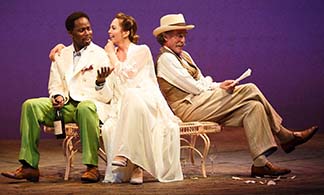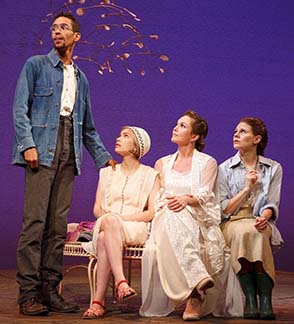By Lucy Komisar
Simon Godwin‘s staging of Chekhov’s “The Cherry Orchard” with Stephen Karam’s adaptation is modern in mood, without changes of costumes. Except that hanging Calder sculptures represent the eponymous trees.
This is a very diverting production, especially a gorgeous costume ball that has a bit of a Fellini-style carnival in it, with characters in tights and glitter, and a clown with a bulbous nose. It suggests surreally the disintegration of society. Or the society as Lyubov Andreyevna Ranevskaya (the excellent Diane Lane), head of an unraveling aristocratic ménage, has known.

The family are upper class neurotics. Leonid Gaev (John Glover) the brother, is sad, funny, “Why am I alive, I have no one.” His pass-time is billiards. Anya (TaviGevinson), the daughter, is so contained that no emotion pours through.
Ranevskaya needs to pay interest on a loan taken on the estate. But there isn‘t the cash. Lopakhin, a business man, the child of serfs, is here played by a black actor, Harold Perrineau. Smart choice. It’s not color-blind casting. Note that Chekhov, the son of a serf, became a doctor.
In this case, attuned to economic changes, Lopakhin wants to put some summer cottages on the space the orchard occupies. Ranevskaya, in flowing white dress and diaphanous jacket, obviously a person of taste, says summer cottages are tacky. But Lopakhin is ascendant. He declares, “If my father and grandfather could see me now. My father and grandfather were slaves.”

Though the conception makes sense, slaves not serfs, making a dated piece seem current, the execution sometimes is hokey, like a soap opera, with a bit too much rushing around. But maybe that‘s another way for saying lively.
My favorite characters were Petya (Kyle Beltran), the student, and Charlotta (Tina Benko), the terrific over-the-top redheaded governess.
Petya puts down the rich intelligentsia. They call themselves the intelligentsia, and — yes, they now address their hired help by their first names, very progressive — but they still treat poor people like they‘re animals. (Remind you of today‘s corporate CEOs and bankers?) He says, They‘ve all got their serious faces perfected for discussing important issues, philosophizing, but meanwhile, right in front of them, the working class is starving. He represents idealism before the 1905 revolution.
As if to make the modern day point, a raggedy, slightly drunk passerby declaims, “…Want to hear something from across the o– He has a coughing spell, then recites:
Give me your tired, your poor,
Your huddled masses yearning to breathe free,
The wretched refuse –.”
Ranevskaya gives him a gold coin and Varya (Celia Keenan-Bolger) protests that they have nothing at home to eat. Ranevskaya says she will ask Lopakhin for a loan. It’s a way of saying, more starkly than Chekhov did, that the aristocrats will be replaced.
Lane heads a wonderful ensemble cast in a production that gives most of them a chance to shine. There is even a self-effacing Joel Grey in a cameo as Firs, a servant, who might have been in a play by Beckett.
“The Cherry Orchard.” Written by Anton Chekhov, adapted by Stephen Karam, directed by Simon Godwin. Roundabout Theatre Company at American Airlines Theatre, 227 West 42nd Street, NYC. 212.719.1300. Opened Oct 16, 2016; closes Dec 4, 2016. 11/5/16.

